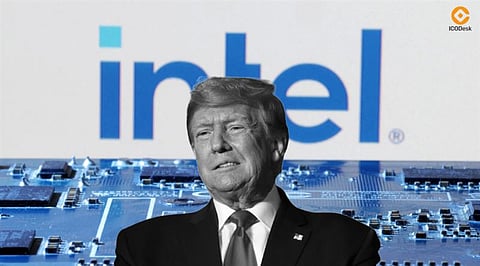

In a notable move aimed at fortifying the US stance on its semiconductor future, former US President Donald Trump announced a deal to ensure 10% American ownership in Intel. The announcement conveyed that this was a strategic step to ensure US supremacy in critical technologies amid rising Chinese competition and a renewed concern over supply chain security.
Trump called the pact a "decisive win for American workers and innovation," adding that protecting semiconductor production at home is key to economic autonomy and security. The agreement fits into Washington's continued effort to decrease dependence on foreign manufacturing bases, especially Taiwan and South Korea, which now dominate high-end chip production.
Intel's new CEO, Lip-Bu Tan, seconded Trump's views in his initial public statement. Tan, a veteran chip maker and a renowned semiconductor industry figure, vowed to revive Intel's worldwide competitiveness by bolstering American R&D and manufacturing capability.
"Intel will lead with innovation, resilience, and American ingenuity," Tan stated. "This investment reaffirms our dedication to enhancing US technological leadership in the presence of competition worldwide.
Industry experts perceive the 10% American share as symbolic rather than controlling but recognize its economic and political value. By placing government-affiliated ownership within, Intel guarantees more substantial alignment with federal subsidies under programs such as the CHIPS and Science Act.
It also assures policymakers that Intel, the country's most crucial semiconductor firm, will be solidly anchored to US national interests.
The action comes at a critical time for the semiconductor sector. Demand for top-performing chips continues to grow, driven by artificial intelligence, military applications, and future consumer electronics.
However, today the US only produces a small percentage of the globe's most sophisticated semiconductors, creating fears over weaknesses in disruptions to global geopositioning.
Lip-Bu Tan laid a roadmap with priorities on scaling Intel's home country fabs,
collaboration with US research universities, and increasing cooperation with American technology companies. "We need to invest boldly in advanced manufacturing, not just to catch up, but to lead," Tan insisted.
Although Trump's personal interest in the deal surprised some analysts, supporters claim that it supports his long history of focusing on reshoring key sectors. However, opponents warn that political involvement in private companies may complicate Intel's international business.
However, the Intel stake sale reflects a wider turn to economic nationalism in the tech industry. With the semiconductor competition heating up, the partial government ownership of Intel can be both a financial anchor and a geopolitical message: America wants to hold on to its leadership position in the chip revolution.